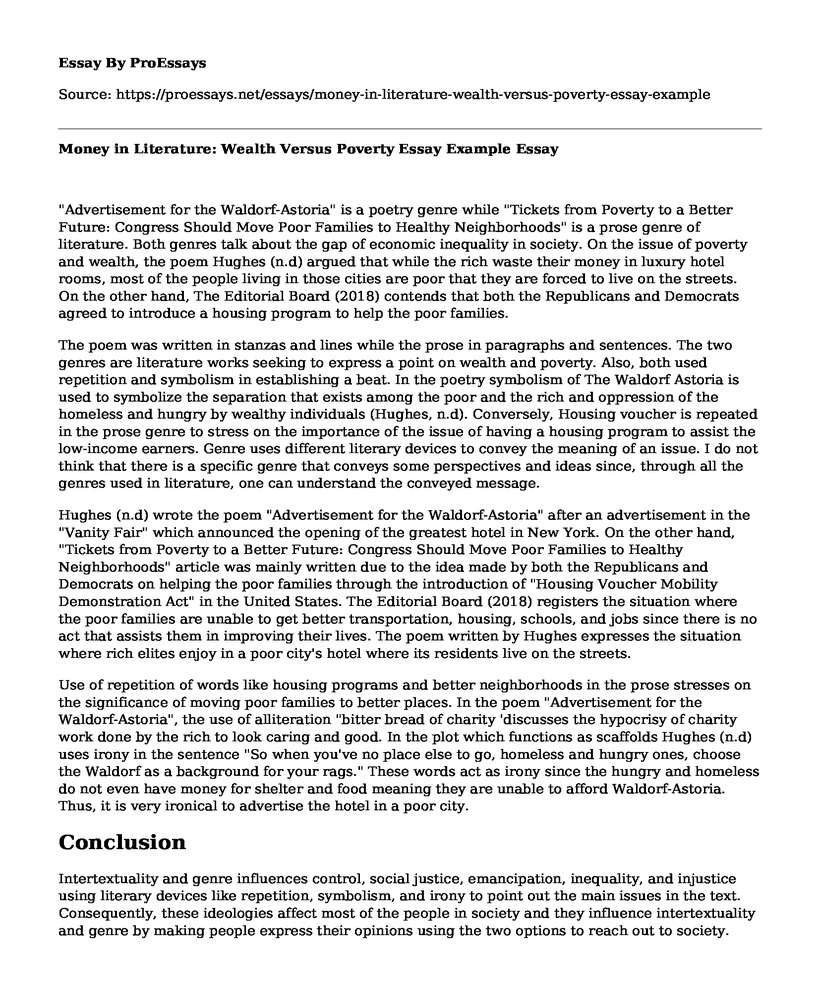"Advertisement for the Waldorf-Astoria" is a poetry genre while "Tickets from Poverty to a Better Future: Congress Should Move Poor Families to Healthy Neighborhoods" is a prose genre of literature. Both genres talk about the gap of economic inequality in society. On the issue of poverty and wealth, the poem Hughes (n.d) argued that while the rich waste their money in luxury hotel rooms, most of the people living in those cities are poor that they are forced to live on the streets. On the other hand, The Editorial Board (2018) contends that both the Republicans and Democrats agreed to introduce a housing program to help the poor families.
The poem was written in stanzas and lines while the prose in paragraphs and sentences. The two genres are literature works seeking to express a point on wealth and poverty. Also, both used repetition and symbolism in establishing a beat. In the poetry symbolism of The Waldorf Astoria is used to symbolize the separation that exists among the poor and the rich and oppression of the homeless and hungry by wealthy individuals (Hughes, n.d). Conversely, Housing voucher is repeated in the prose genre to stress on the importance of the issue of having a housing program to assist the low-income earners. Genre uses different literary devices to convey the meaning of an issue. I do not think that there is a specific genre that conveys some perspectives and ideas since, through all the genres used in literature, one can understand the conveyed message.
Hughes (n.d) wrote the poem "Advertisement for the Waldorf-Astoria" after an advertisement in the "Vanity Fair" which announced the opening of the greatest hotel in New York. On the other hand, "Tickets from Poverty to a Better Future: Congress Should Move Poor Families to Healthy Neighborhoods" article was mainly written due to the idea made by both the Republicans and Democrats on helping the poor families through the introduction of "Housing Voucher Mobility Demonstration Act" in the United States. The Editorial Board (2018) registers the situation where the poor families are unable to get better transportation, housing, schools, and jobs since there is no act that assists them in improving their lives. The poem written by Hughes expresses the situation where rich elites enjoy in a poor city's hotel where its residents live on the streets.
Use of repetition of words like housing programs and better neighborhoods in the prose stresses on the significance of moving poor families to better places. In the poem "Advertisement for the Waldorf-Astoria", the use of alliteration "bitter bread of charity 'discusses the hypocrisy of charity work done by the rich to look caring and good. In the plot which functions as scaffolds Hughes (n.d) uses irony in the sentence "So when you've no place else to go, homeless and hungry ones, choose the Waldorf as a background for your rags." These words act as irony since the hungry and homeless do not even have money for shelter and food meaning they are unable to afford Waldorf-Astoria. Thus, it is very ironical to advertise the hotel in a poor city.
Conclusion
Intertextuality and genre influences control, social justice, emancipation, inequality, and injustice using literary devices like repetition, symbolism, and irony to point out the main issues in the text. Consequently, these ideologies affect most of the people in society and they influence intertextuality and genre by making people express their opinions using the two options to reach out to society. Therefore, it is the contemporary ideologies encountered in our daily lives that makes people express their opinions using different genres of literature.
References
Hughes, L. (n.d.). Advertisement for the Waldorf-Astoria. Retrieved from https://allpoetry.com/Advertisement-For-The-Waldorf-Astoria
The Editorial Board. (2018). Tickets from poverty to a better future: Congress should move poor families to healthy neighborhoods. The New York Times. Retrieved from https://www.nytimes.com/2018/09/12/opinion/vouchers-poverty-congress-mobility.html
Cite this page
Money in Literature: Wealth Versus Poverty Essay Example. (2022, Dec 06). Retrieved from https://proessays.net/essays/money-in-literature-wealth-versus-poverty-essay-example
If you are the original author of this essay and no longer wish to have it published on the ProEssays website, please click below to request its removal:
- Removal of Indian Names and Mascots in Sports Teams
- Article Analysis Essay on "Canada Should Legalize All Recreational Drugs"
- The Fall of the House of Usher Chapter One Passage Analysis Essay
- Alcohol Dependence and Substance Abuse - Essay Sample
- Research Paper on American-Pakistani Males Open Up on Feminism In Their Culture
- Essay Example on Exploring Racism & Culture: A Movie About American Diversity
- Gifts: Attractive, Responsible, Fearsome Abilities - Book Review Sample







